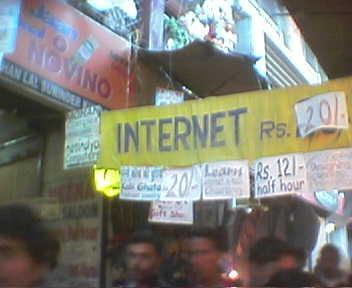Internet Cafes Go Global
By Kim Tae-gyu Staff Reporter , Hankooki.com The Korea Times
09-11-2005 17:32
South Korea’s unique culture of Internet cafes, called ``PC Bang,’’ will be exported to neighboring regions by ValueSpace, which owns the country’s top PC Bang franchise CyberPark.
ValueSpace president Choi Yeun-wook revealed the firm’s plan to make inroads into Japan and China next year.
``We will enter Japan in 2006 and China will follow after the 2008 Beijing Olympic Games, a sports gala that will secure copyrights in the mainland,’’ the 40-year-old Choi said in an interview with the Korea Times.
``We aim to set up more than 7,000 affiliated PC Bang in Japan, China and Southeast Asian countries such as Indonesia, Malaysia and Thailand in the long run.’’
Under its CyberPark franchise that debuted in 2002, ValueSpace today retains the highest number of PC Bang, amounting to roughly 250 across the country.
Considering the PC Bang business was on the decline in 2002, it is a notable achievement for a start-up brand to become a leading franchise in just three years.
PC Bang, sometimes dubbed local area network (LAN) gaming center, is a place where people can get access to the high-speed Internet for a fee of about 1,000 won ($1) an hour.
In Korea, PC Bang arose in the mid 1990s and now up to 22,000 cyber cafes are tucked into every spare sliver of real estate, armed with top-of-the-line computers and high-bandwidth connectivity.
They come in various sizes from a very small one equipped with less than 10 personal computers to mega-sized ones with hundreds of terminals.
PC Bang is an important contributor to the economy, as it accounts for about one-fourth of the country’s total desk top computer demand of 1 million units a year.
It also helped the online gaming industry flourish in Korea by providing a business model to game developers, who found avid consumers at PC Bang-goers.
PC Bang in World
PC Bang is starting to spring up in other nations. In China, the number of Internet cafes reaches roughly 120,000 and Japan is also poised to embrace the new culture.
In this climate, Choi says this is a perfect time for Korean players to wade into the emerging markets on the back of their knack for running the business.
`` PC Bang in Korea has gone through a three-stage development, and China and Japan are only now entering the second stage, when the number of PC Bang explodes. We can preempt the market based on our experience,’’ Choi said.
He explained the first stage is when only risk-taking early adopters visit a rare PC Bang to surf the Web or check e-mail, while a rising penetration rate of the high-speed Internet and the explosion of multiplayer games mark the second period.
``Korea witnessed PC Bang mushroom and online game catch on beginning 1998, when the affordable broadband offerings were launched for household users,’’ Choi said.
``In the third phase, the market becomes overstuffed and PC Bang gets bigger and evolve into a cozy place since hyper-competition urges them to find differentiation factors.’’
China and Japan are propagating commercial broadband services, marking the onset of the second stage and will be sure to form huge markets for PC Bang franchise business, according to Choi.
``Over the long haul, Korea will be able to make a lucrative model of exporting game contents, the broadband network and PC Bang culture all at the same time,’’ he said.
ValueSpace especially fixes its eyes on the potential-filled Chinese market, where PC Bang cannot start business without subscribing to a franchise. That contrasts to Korea, where about 10 percent of overall PC Bang signs up for such a franchise.
``Already, some franchise owners in China asked us to conduct joint businesses. They know our forte that we experienced what they will face in the future. For them, we possess a crystal ball for what will happen in their country later,’’ Choi said.
Monday, September 12, 2005
Subscribe to:
Post Comments (Atom)

No comments:
Post a Comment